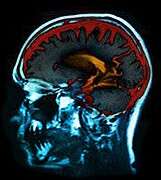Having both migraines, depression may mean smaller brain

(HealthDay)—Migraines and depression can each cause a great deal of suffering, but new research indicates the combination of the two may be linked to something else entirely—a smaller brain.
Already aware that people with migraines face double the risk of depression, scientists wanted to determine if having both conditions together affected total brain volume. The difference in size—about 2 percent—isn't alarming, study authors said, but needs further research to determine if the disparity causes any meaningful health effects.
"There are several potential explanations why those with both conditions have smaller brain volume," said study author Larus Gudmundsson, a research associate at the Uniformed Services University of the Health Sciences in Bethesda, Md. "There could be some genetic factor driving the whole thing. It could be related to pain mechanisms [in the brain]. It's also possible there are social and economic reasons."
The study is published in the May 22 online issue of the journal Neurology.
More than 36 million Americans—about 12 percent of the population—are estimated to suffer from migraine headaches, which can be debilitating, according to the U.S. National Library of Medicine. Meanwhile, major depression affects 15 million people, and Gudmundsson estimated that perhaps 3 percent to 4 percent of Americans suffer from both conditions.
Gudmundsson and his colleagues analyzed data from Iceland on about 4,300 older adults at two time points. At an average age of 51, participants were assessed for migraine headache incidence and about 25 years later were asked about their lifetime history of major depressive disorder. A full-brain MRI scan was taken at that later point to measure brain volume, when participants were between 66 and 96 years old.
Compared to those with no history of migraines or depression, those with both conditions had brain volumes about 2 percent smaller. There was no difference in the total brain volume when comparing people with only one of the conditions to those with neither condition.
Although the study found a connection between brain size and the combination of migraines and depression, it did not show a cause-and-effect relationship, as one expert noted.
"We certainly know that migraine sufferers tend to have smaller brains than non-migraine sufferers. But I'm not sure this study confirms that, apart from a neurodegenerative process, the two diseases act to do anything to increase the rate of [brain shrinkage] with aging," said Dr. Dara Jamieson, an associate professor of clinical neurology and director of the headache center at New York-Presbyterian/Weill Cornell Medical Center, in New York City.
"The people they were imaging [with MRI] were quite old—66 to 96—and you can expect brain atrophy in that group," added Jamieson, who was not involved with the study. "Maybe there's something to be said for these disorders accelerating brain atrophy ... but to take away that because of migraine and depression that your brain is smaller is unnecessarily glum."
Study author Gudmundsson, who's also a guest researcher at the U.S. National Institute on Aging, pointed out that those with migraines and depression may not suffer brain shrinkage since it's possible that their brains are smaller from birth.
"The clinical impact needs to be determined," he added. "We have to keep in mind that several studies have looked at migraine and cognition [thinking ability] and have not found a difference in cognition. That is reassuring."
More information: The U.S. National Library of Medicine has more about migraine headaches.
Health News Copyright © 2013 HealthDay. All rights reserved.















